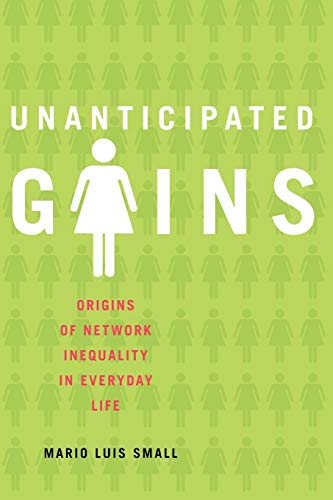All books / Book
Unanticipated Gains: Origins of Network Inequality in Everyday Life

| Full title: | Unanticipated Gains: Origins of Network Inequality in Everyday Life |
|---|---|
| ISBN: | 9780199764099 |
| ISBN 10: | 0199764093 |
| Authors: | Small, Mario Luis |
| Publisher: | Oxford University Press |
| Edition: | Reprint |
| Num. pages: | 312 |
| Binding: | Paperback |
| Language: | en |
| Published on: | 2010 |
Read the reviews and/or buy it on Amazon.com
Synopsis
Social Capital Theorists Have Shown That Some People Do Better Than Others In Part Because They Enjoy Larger, More Supportive, Or Otherwise More Useful Networks. But Why Do Some People Have Better Networks Than Others? Unanticipated Gains Argues That The Practice And Structure Of The Churches, Colleges, Firms, Gyms, Childcare Centers, And Schools In Which People Happen To Participate Routinely Matter More Than Their Deliberate Networking. Exploring The Experiences Of New York City Mothers Whose Children Were Enrolled In Childcare Centers, This Book Examines Why A Great Deal Of These Mothers, After Enrolling Their Children, Dramatically Expanded Both The Size And Usefulness Of Their Personal Networks. Whether, How, And How Much The Mother's Networks Were Altered--and How Useful These Networks Were--depended On The Apparently Trivial, But Remarkably Consequential, Practices And Regulations Of The Centers. The Structure Of Parent-teacher Organizations, The Frequency Of Fieldtrips, And The Rules Regarding Drop-off And Pick-up Times All Affected The Mothers' Networks. Relying On Scores Of In-depth Interviews With Mothers, Quantitative Data On Both Mothers And Centers, And Detailed Case Studies Of Other Routine Organizations, Small Shows That How Much People Gain From Their Connections Depends Substantially On Institutional Conditions They Often Do Not Control, And Through Everyday Processes They May Not Even Be Aware Of. -- Book Jacket. Social Capital And Organizational Embeddedness -- Childcare Centers And Mothers' Well-being : Whether Mothers Did Better When Their Children Were In Daycare -- Opportunities And Inducements : Why Mothers So Often Made Friends In Centers -- Weak And Strong Ties : Whether Mothers Made Close Friends, Acquaintances, Or Something Else -- Trust And Obligations : Why Some Mothers' Support Networks Were Larger Than Their Friendship Networks -- Ties To Other Organizations : Why Mothers' Most Useful Ties Were Not Always Social -- Organizational Ties And Neighborhood Effects : How Mothers' Nonsocial Ties Were Affected By Location -- Extensions And Implications. Mario Luis Small. First Issued As An Oxford University Press Paperback, 2010. Includes Bibliographical References (p. 263-279) And Index.